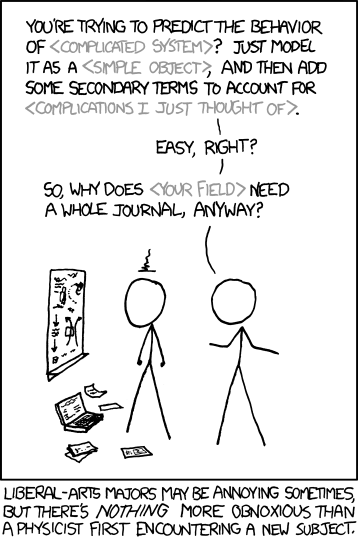Ben Zimmer has a wonderful article on “When physicists do linguistics” over at the Boston Globe, which can perhaps be best summarized by this comic from xkcd:
Joking aside, I am happy that other disciplines have an interest in language – however, I hate when other disciplines try to do linguistic research and fail because they do not involve any actual linguists in the research. I agree completely when Zimmer says that there is a “need for better communication between disciplines that previously had little to do with each other.” Communication among related fields could use a little boost too, because it isn’t just physicists who publish papers that contradict linguistic research. Psychologists, speech pathologists, and cognitive scientists have been doing it wrong for a while too, especially when it comes to multilingual and cultural aspects of language acquisition.
Linguistics seems to the be the field that everyone thinks they can do without any special training. Most people wouldn’t think of talking about chemistry or mathematics without actually having studied those subjects. Yet everyone seems to think they are experts on language simply because they speak a language (their native language) or because they have learned another language. Sorry, but those abilities do not make you a qualified linguist nor do they give you the right to talk about language without checking facts or to teach language as if you were an experienced teacher. I know how to drive a car, but I don’t go around pretending to be a certified mechanic or give advice to others on how to fix their own cars.
Robert Lane Greene’s book, You Are What You Speak: Grammar Grouches, Language Laws, and the Politics of Identity, is about this phenomenon. People believe, and repeat, such ridiculous things as “this language has eleventy billion words for X” or “this language is primitive but that language is logical” all the time. Even worse, respected authors repeat these myths in their articles and books, such as Bill Bryson in The Mother Tongue, and so they are repeated again and again without anyone questioning whether they are true or not. These myths are dangerous because a lot of them are based on ethnocentrism and the perceived superiority of the way we speak compared to everyone else.
Please, do yourself a favor and study language seriously instead of repeating myths. Talk to actual linguists, read books written by actual linguists or whose authors talked to actual linguists. In addition to You Are What You Speak, you can start with Language Myths (for a general overview), Vocabulary Myths (for language learners/teachers, which I previously posted about), and the “truth-squad” blog Language Log. But most importantly, always question what is written about language even if it is published by best-selling authors or academic researchers because they may not be linguists at all.
Update 26/02/13: And another one! Ugh. “Why speaking English can make you poor when you retire” about research done by a behavioural economist. Hey, that’s not linguistics! ::sigh:: At least the article quotes my hero, John McWhorter.
Update 15/03/15: So glad I’m not the only one who complains about this: If you’re not a linguist, don’t do linguistic research by @EvilJoeMcVeigh

